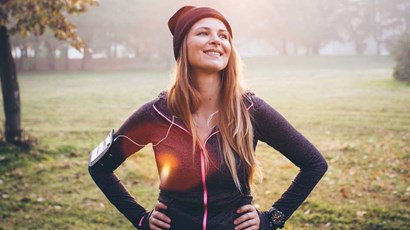Strictly Come Dancing 2023: Are dance workouts good for keeping fit?

How to start a new fitness routine this autumn
If you've had a summer of BBQs, al fresco dinners and lazy weekends in the sun, then, like a lot of us, your exercise regime may have fallen by the wayside. Now the weather is cooling down and children are back at school, this is the perfect time of year to get back into a routine and set some fitness goals.
The benefits of exercising are wide-ranging, from improved mental health to a lower risk of serious diseases, but still many of us spend too much of our lives sitting and lying.
Around one quarter1 of the UK population aren't meeting the government recommendations for physical activity, which are2:
- Either 150 minutes - two and a half hours - of moderate-intensity activity per week, such as brisk walking.
- Or 75 minutes - one and a quarter hours - of high-intensity exercise per week, such as running.
- Or a mixture of both.
It's not just a problem in the UK - the World Health Organization ranks sedentary behaviour as among the 10 leading causes of death worldwide3.
Embarking on a new fitness regime
Autumn feels like a new beginning, with many people treating this season as their New Year. A new fitness regime could mean exercising outdoors, at home or in the gym.
"If you're young, fit and healthy, generally just find something you like and go for it," says GP Dr Jeff Foster. "If you have a medical problem I would advise speaking to someone trained at a fitness centre and then if you have any further concerns speak to your GP."
Autumn is all about making the most of the great outdoors after the summer holidays. Outdoor activity could mean a number of different things. You could aim for 10,000 steps of brisk walking, embark on a 10k running challenge, find a scenic cycling route, or start a team sport or boot camp in your local park - any activity which allows you to be outside and at one with the reds and golds of nature.
As the climate cools, exercise becomes a lot more comfortable outdoors. If you're still not sure what to try, have a think about your goals. Look first at what you want to achieve - is it weight loss? General fitness? Or do you want to feel stronger, for example?
"Often team sports or groups are very helpful to encourage motivation and reach targets, but they aren't for everyone," says Dr Foster. "There are specific types of exercise that are better for certain people. For example, swimming is very good for people with joint problems, weight-bearing exercise is good to prevent osteoporosis. There is now increasing evidence that short, very intense bursts of exercise are more beneficial than long, low impact," he says.
This could be in the form of a high-intensity interval training (HIIT) class at the gym or try a workout at home - you can find plenty of free workouts on YouTube.
Ready to hit your weight loss goals?
Find a range of services to suit you, from medication through to managed programs
New activities for the new year: why switch up your exercise?
Most of us have our favourite physical activities. But trying something new, or varying the exer...
How to get started
If you've put off exercise for a while, here are some useful tips from our experts:
Enjoy it
The most important thing is to find something you love. If you enjoy it you will want to do it more and that is the best motivation. Try out different things and decide if there's something you enjoy doing. Most people who dislike exercise just haven't found the right exercise.
Set goals and stick with them
Set realistic goals, measure results and look to others who have achieved what you want. Schedule in your workout and place it at the top of your priority list.
Eat well
"Keeping a food diary will make you conscious of what you're eating and drinking. Your diet should be healthy and nutrient-dense if you're seriously intending to become fitter. Experts say 90% of training is diet and 10% is activity - there is no point training hard if you eat rubbish," says Foster.
Don't do it alone
Training with friends or groups can help you keep motivated for longer.
Sleep
Aim for 7-8 hours per night, as poor-quality sleep reduces our ability to train and make good food choices.
Be ready
Get your workout clothes and trainers ready the night before. This way you'll have no choice but to wear that outfit and you'll be 100% ready. Wear your fitness clothes as much as possible and wherever you can. It's like wearing a uniform and being in a constant state of ready. In other words, your afternoon walk might turn into a brisk one or even a jog, if you're dressed appropriately.
Why starting now will see you through winter and beyond
With the days getting shorter our urge to hibernate really starts to kick in in late autumn. In terms of exercising and fitness, preparation is key.
School half-term, Halloween, Fireworks Night and the run-up to Christmas can play havoc with our diet and exercise. Establishing a good diet and exercise regime can help combat the cumulative weight gain effect. Create good habits for damage limitation.
Another thing to consider is how exercise can impact on our mental health at this time of year. For those who experience seasonal affective disorder (SAD) or depression in the colder months, exercise can help stimulate body chemicals called endorphins which are natural mood boosters.
Staying motivated
Most new fitness regimes fail within six weeks. Stay motivated with these tips.
- Make yourself accountable to family and friends.
- Stay motivated by telling yourself daily affirmations.
- As you get fitter, increase the intensity of your exercise.
- Is boredom setting in? In that case, try something new.
- Set yourself SMART goals - these should be specific, measurable, achievable, realistic and timely.
- Reward yourself each time you reach a goal. This could be a massage or a trip to the cinema, for example. Just try not to make it a food-related goal.
Further reading
- Sport England: Adults’ activity levels in England bounce back to pre-pandemic levels.
- GOV.UK: Physical activity: applying All Our Health.
WHO: Physical inactivity a leading cause of disease and disability.





